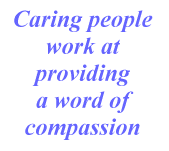"It's Not What I Say"
continued from Home Page
All are legitimate, caring questions. None of them, however, give a clue
that Jane’s  sadness
is recognized. The first response ought to tune into her
feelings. Initially she needs at least one verbal hug (“Oooh that’s
sad.”). Then you go on and help her to tell the story in factual detail.
sadness
is recognized. The first response ought to tune into her
feelings. Initially she needs at least one verbal hug (“Oooh that’s
sad.”). Then you go on and help her to tell the story in factual detail.
Slip In A Verbal Hug
I was standing near some people when a man walked up. He said,
“Battery’s dead—anybody got jumper cables?” I was impressed when
a woman spoke up: “What a bummer. Sure, I’ve got cables in my trunk.”
She acknowledged the crumminess of the situation first, then solved his problem. A tiny detail the guy may not have noticed at all, but nevertheless she slipped a little “hug” into his frustration. (“What a bummer.”)
Joe Vent arrived home on a hot summer day with the news, “The car’s air conditioner stopped working on the way home.” Jennie Vent promptly instructed, “Well, you better get it to the mechanic.”
 What
Jennie said was common sense—of the garden variety—that Joe did not appreciate.
Her guidance missed the point. Joe needed a small dose of empathy. Jennie
could have provided that with one word — “frustrating.” Then Joe would
have felt connected with Jennie, his feelings understood rather than ignored.
What
Jennie said was common sense—of the garden variety—that Joe did not appreciate.
Her guidance missed the point. Joe needed a small dose of empathy. Jennie
could have provided that with one word — “frustrating.” Then Joe would
have felt connected with Jennie, his feelings understood rather than ignored.
The death of the air conditioner was a tiny thing in Joe’s life. It didn’t hurt him at all in the grand scheme of things. Likewise Jennie’s response mattered little. But caring people work at such small things and develop a habit of dishing up those little words of compassion (‘feeling with’ is what compassion literally means). I like to call them verbal hugs!
Never “Poor Baby” NEVER!
When I used the air conditioner example in a New Hope Telephone Counselor’s
class, several suggested using the “poor baby” response. Personally, I
can think of no time where this mocking expression could be appropriate.
People’s feelings are not to be trifled with. “Poor Baby” hurts,
belittles, and demeans. Bystanders may laugh with amusement, but the targeted
one forces a smile to disguise his/her embarrassment and injury.
There is a time and place to fix, to advise, to moralize even. But caring people tune in for the feelings first. They focus on the emotion and name it—then move to what else is called for.
Study the following statements. Decide what the person is feeling. Note the typical non-feeling response. Create an understanding remark that reflects the person’s feelings:
1.) A teenager returns home from high school baseball tryouts. He bursts into the house and says: “I got cut. I didn’t make it.” What is he feeling? _____________________________
Ordinary Reply: “Well, now you can put more time into studying.”
Craft your brief feeling/reflecting reponse: (“Ooooh, you tried so hard. What a disappointment!”) ________________________________________________________
2.) An 89-year-old man living in a nursing home: “I will never go home again.” What is he feeling? __________________________________________________________________
Ordinary Reply: “But Dad, this is such a nice place. They love you here.”
Write a response that reflects his feelings: (“After so many years there, it must seem unreal.”)________________________________________________________________
3.) A young married woman: “I’m pregnant.”
What is she feeling? (Nervous excitement?) ______________________________________
Ordinary Reply: “When are you due?”
A feeling-oriented response: (“Oh, wow! Wonderful!”) _____________________________
4.) An elderly retiree: “Well, our house is sold and we’re moving to Las Vegas.” What is he/she feeling? (Cautious apprehension? Eager anticipation? Relief?) ____________________
Ordinary Reply: “I hear housing is cheap there.”
A feeling-oriented response: (“It must be exciting, but a little scary too.”) _____________
5.) Your high school baseball coach: “We’ve
lost our first four games.”
What is he feeling? _________________________________________________________
Ordinary Reply: “Well you’ll probably win the next four.”
A feeling-oriented response: (”So you’re a bit discouraged.”) ______________________
Notice the ordinary replies —they either totally ignore the feelings (“Now you can study more” and “I hear housing is cheap there”), ask for more information (“When are you due”), or endeavor to fix the situation (“...this is such a nice place...” and “You’ll probably win the next four.”).
Sometimes wonderful connections are made with others when a feeling is picked up on and named.
 A
group of friends were enjoying coffee one evening with the central topic
being that a couple among them were living in a hotel, due to a fire in
their home. There were many teasing comments like: “It must be nice
eating in a fine restaurant every night.” And “I wish I could go
out and buy a whole new wardrobe.” Lots of laughs were enjoyed until
one woman said, “I’ll bet that fire was pretty scary...”
A
group of friends were enjoying coffee one evening with the central topic
being that a couple among them were living in a hotel, due to a fire in
their home. There were many teasing comments like: “It must be nice
eating in a fine restaurant every night.” And “I wish I could go
out and buy a whole new wardrobe.” Lots of laughs were enjoyed until
one woman said, “I’ll bet that fire was pretty scary...”
Immediately the mood changed as tears gathered in the eyes of the fire victims. And the whole conversation shifted to something very different from the guffaws and laughter. There were tears all around as the fright, panic and losses were shared around the table.
A hilarious time shifted into bonafide care because one person dared to go against the flow and name the feeling she guessed was a hidden part of the picture.
Step out of the rank and file!
Distribute verbal hugs!
Dr. James Kok is Director of Care Ministry for the Crystal Cathedral Congregation of Garden Grove, CA. He has been an ordained minister of the Christian Reformed Church of America for 35 years. He speaks extensively throughout the United States and Canada. His hands-on work as a pastor has led to a profound understanding of the issues and dynamics of personal grief and human suffering on which he has written and spoken at length.